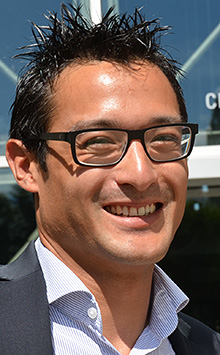Life after UniNE
“As soon as you’ve found your path, you have to go for it… “
Simon Geinoz, Legal Advisor with the Union Cycliste Internationale (UCI)
Simon Geinoz completed a Master’s degree in Sports Law in 2009. Having worked as an assistant at the University of Neuchâtel for a year, he joined the Union Cycliste Internationale (UCI) in Aigle, where he works as a legal advisor for the anti-doping legal service.
 Right after graduating, you joined the UCI, a world-renowned sports federation. A dream come true?
Right after graduating, you joined the UCI, a world-renowned sports federation. A dream come true?
Yes. What with my Master’s specialization, I really wanted to work in the field of sports law. One option was to work for one of the bodies governing sport. Apart from the most obvious, such as the IOC, UEFA, FIFA or the UCI, there are few federations which let you develop your skills and work as a full-time legal practitioner. The opportunities are rare. I sent off a speculative application. They kept me on file and contacted me as I was finishing my first year as an assistant. I was very lucky: I was at the right place at the right time.
Do you know the world of cycling well?
Before joining the UCI, I knew about it from the media. At the time, like many people, I was quite interested in all the stories about doping. Even though the world of cycling has come in for a lot of criticism, there are still millions of spectators, whether by the roadside for the Tour de France or at the Olympic Games, not to mention amateur competitions which also draw large crowds. Cycling remains very popular — maybe because it’s not just a sport, but a means a transport: everyone rides, or at least has ridden, a bike.
Today, you work for the UCI’s anti-doping legal service, alongside many of the leading figures fighting the battle against doping. What does your day-to-day work entail?
I’ve been working for the UCI for nearly five years, but I’ve only been involved in anti-doping for three. In 2013, under the guidance of the new president Brian Cookson, a new anti-doping legal unit separate from the UCI was created. Officially, I still work for the UCI, but my unit is managed independently, and I work with external legal counsel every day. More specifically, the unit deals with all the questions relating to the UCI anti-doping programme; every year it deals with around sixty cases where anti-doping rules have been broken. This involves notifying the sportspeople in question, seeing through the disciplinary procedures within their national federations, and, as of 2015, in the UCI’s own anti-doping tribunal.
We work with the Cycling Anti-Doping Foundation (a foundation independent of the UCI, charged with implementing its anti-doping programme), national anti-doping organizations as well as the World Anti-Doping Agency. At the same time, I take part in seminars open to the entire anti-doping community. In general, I’ve kept abreast of the legal procedures and sporting regulations. One of the main challenges is communication: how do we get the message across, not just to sportspeople but, more importantly, to the public? It’s a sensitive matter, more so when it comes to doping.
Did your Master’s degree prepare you for this job?
Yes, absolutely. It’s an excellent toolkit. I felt like I was in my element straight away. When I heard about this Master’s programme — the only one of its kind in French-speaking Switzerland — during my law studies at Geneva, I didn’t hesitate for a second. I’ve always loved sport, especially volleyball, which I’ve been involved in for years, as a player and a coach. But aside from the competitive element, the politics of it has always fascinated me. During my Master’s degree, I was able to study only the subjects I found interesting. It was the sports law courses which I particularly enjoyed. In particular, I remember Professor Denis Oswald’s classes, and his experience of federative bodies; this institutional focus was counterbalanced by Professor Antonio Rigozzi, whose perspective, especially as a lawyer representing cyclists, was much closer to that of the athletes. Two interesting and informative viewpoints which taught me a great deal.
You got your Bachelor’s degree in Geneva. What are the strengths of the University of Neuchâtel?
The first thing that struck me was the University’s size. There are far fewer students than at Geneva. The second was the extent to which the professors were available to respond to questions — not to mention the assistants, who are relatively numerous. That’s a great advantage. As for the location, it’s perfect. Of course there’s the lake; but the easy access to the station, too. I took the train every day, so it was very handy. I have great memories of my time there; I had a very busy social life, when it came to sports and other activities.
When I finished my Master’s degree, I enjoyed going back, this time as an assistant. Working with Professor Piermarco Zen-Ruffinen and the CIES (Centre international d’étude du sport, based in Neuchâtel), I had a year to enhance my knowledge of sports law. For me, this was a way to work towards my objective: working in an administrative body governing sport. Today, I’m delighted still to have links to the UniNE. On several occasions, I’ve been invited to talk about the UCI as part of the seminars of my former Professor Antonio Rigozzi, who is the Federation’s external counsel.
What advice would you give to current or future students?
Do what you love. It doesn’t matter if it’s well recognized or not. Have patience, persevere. But once you’ve found your path, you have to keep going for it and work towards the aim you’ve chosen before you choose another. Luck is always important, but you have to make your own opportunities.
Interview UniNE 2015

